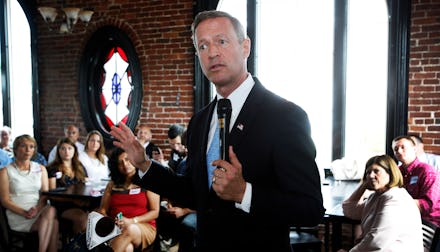Martin O'Malley Comes Out Swinging Hard at Wall Street

On Wednesday, Democratic presidential hopeful Martin O'Malley released a white paper that made one thing crystal clear: He has his sights set on Wall Street.
In a policy document released the day after he unveiled the most progressive proposal addressing student debt of any of the Democratic candidates, the former governor of Maryland promised to aggressively reform and police Wall Street using language that couldn't conceivably be uttered by a candidate with close ties to the financial sector (hint: Hillary Clinton).
"Today, your — too-big-to-fail, too-big-to-manage and too-big-to-jail — megabanks pose an enormous risk to the financial system, the economy and American families," wrote O'Malley in an open letter to the financial world that was published Wednesday alongside the white paper. "They are so big and so interconnected with the entire financial system that the failure of one or more of them could cause the collapse of the entire U.S. economy."
O'Malley made it clear that his harsh words for bankers weren't born of a desire to upend capitalism, but rather a commitment to its preservation. During the financial crisis, the government handled Wall Street gently for fear that its failure could take the economy down with it. O'Malley outlines how that process reinforced its immunity to accountability and its government-backed privilege in the economy.
"Now, because your institutions are so large, so leveraged and pose such a grave threat to our economy, you don't face the same rules of the free market that apply to everyone else," he wrote. "If your bets go bad, you don't face bankruptcy — taxpayers bail you out. When things go well, the upside is all yours and you get to cash in exorbitant bonuses. This violates the very principle of free market capitalism."
The plan: The white paper posits a wide range of ideas for overhauling the management of the financial sector, most of which are tied to dramatically boosting the means by which Wall Street is regulated and getting tougher on enforcing consequences for its misdeeds.
One of the most striking elements of O'Malley's proposal is his continued insistence on doing away with the "too-big-to-jail" paradigm of regulation. He pledges that as president he would appoint officials in the Department of Justice and the Securities and Exchange Commission who would break the pattern of seeking settlements with big banks for their violations and instead actually pursue criminal cases.
On the matter of evaluating how badly banks have gone off track, he suggests a points system that boosts transparency and accountability:
"The largest banks have been able to get away with repeated violations of the law because the only penalty they have faced has been fines. Governor O'Malley will implement a DMV-style points-accrual system that will assign points to infractions committed by financial firms and their affiliates. He will make the points system fully transparent — so that employees, creditors and investors all have access to them and can make decisions based off them — and have the end result be the revocation of an entity's right to operate."
The paper is forceful on the systemic risk posed by the big banks, making the case for breaking them up and instituting strict limits on their size.
O'Malley explains that the Glass-Steagall Act should be reinstated "to once again separate traditional banks from riskier financial services, while updating protections to account for new banking activities and prevent the new rules from being watered down."
Where it fits into his campaign: O'Malley has a number of other regulatory proposals, including ideas on how to slow the revolving door between the financial sector and the government agencies that regulate them, and increasing funding for the government's instruments for regulating the riskiest Wall Street activity.
At its core, the paper is about bringing about the kind of reform that never came about in the aftermath of the financial crisis, much to the chagrin of progressives.
"If you — and your megabanks — which we, the American taxpayer, saved, want to begin to restore the confidence in your leadership, you need to start by saying two things: 'we're sorry' and 'thank you,'" he writes in his letter.
O'Malley's proposal places him squarely in a camp shared by the de facto leader of the progressive Democrats, Sen. Elizabeth Warren, and presidential candidate Sen. Bernie Sanders. In a Democratic race that has been defined by the candidates running further and further to the left, O'Malley is making it clear that he intends to compete for the same space as his rivals.